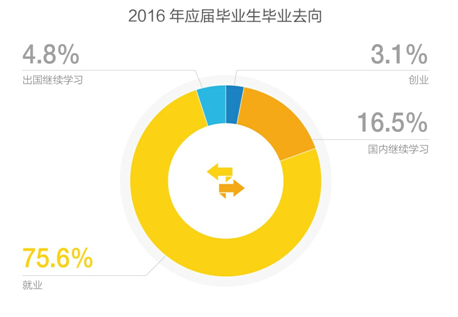(单词翻译:单击)
Given a choice, Chinese university graduates prefer to find employment rather than start a company.
在就业和创业之间进行抉择时,中国的大学毕业生偏向于前者。
A report by human resources website Zhaopin released recently found that only 3.1 percent of students expecting to graduate in July said they will start their own business, down from 6.3 percent in 2015.
智联招聘最近的一份调查报告显示,在参与调查的2016届应届毕业生中,毕业后选择创业的比例为仅仅只有3.1%,而2015年的比例是6.3%。
"The Chinese government, universities and investors have provided a friendly environment for young startups. However, the failure rate of fresh graduates founding startups is still too high due to the lack of experience, resources and networking," said Wang Yixin, a senior consultant at Zhaopin.
智联招聘高级职业顾问王一新表示:“虽然国家政策、各大高校和投资环境给大学生创业提供了良好的土壤,但鉴于大学生经验欠缺、资源积累不足、人脉不足等原因,目前大学生创业成功的概率并不高。”
"In addition, universities have paid a lot of attention to cultivating innovation instead of starting up companies. This is another reason for the low desire on campus to found startups."
“加之相比创业,高校更注重培养学生的创新意识。这也是大学生创业意向如此低的另一个原因。”

At the same time, college graduates' interest in further education has also dwindled, leading to an increase in students wanting employment from 71.2 percent last year to 75.6 percent this year. Nearly 30 percent of those graduates accepted offers from the internet industry, which is among the highest paying.
与此同时,大学毕业生选择继续深造的意向也降低了,这让今年选择就业的人数比例达到了75.6%,而去年这一数据为71.2%。
Zhang Jingxiu, executive director of Beijing-based employment consultancy Newjincin Research Institute, said he didn't monitor the significant decrease of students' willingness to start businesses, but he does admit the desire to found startups among students on campus is low.
提供就业指导工作的北京新锦程研究院的执行院长张景岫表示,他并没看到高校学生的创业意向有降低的趋势,但是他承认学生的自主创业意向很低。
"Students are not suited for starting businesses on their own," said Zhang, adding that vocational students are more eager to start businesses than university undergraduates.
张景岫说:“学生本身并不适合创业。”他补充说道,职业院校的学生比大学生更渴望自主创业。
"According to our survey last year, only 0.6 to 0.7 percent of students at universities were thinking about starting their own companies. The number among vocational school students was as high as 2.2 percent. However, the idea of vocational students starting businesses is related more to creating jobs for themselves, and the majority of them have chosen to have online shops."
“根据我们去年的调查,仅仅只有0.6%-0.7%的大学生有自主创业的意向。而这个比例在职业院校达2.2%。然而,职业院校的学生创业的目的是为了为自己创造就业岗位,并且大多数人选择了开网店。”
In the past 12 months, more than 20 provinces have introduced policies to encourage students to start their own companies by allowing them to quit studying but keep their student status for two to eight years. However, many industry insiders insist that students complete their studies and work a few years first.
在过去的一年中,20多个省推出鼓励学生创业的政策,在创业期间,允许学生休学2至8年,并保留其学籍。然而,很多行业内部坚持学生应该首先完成学业,并先工作几年。
Chen Yu, vice-president of the China Association for Employment Promotion, said a startup may be meaningful, but one should not expect too much from it.
中国就业促进会副会长陈宇表示,虽然创业意义重大,但是我们不应该对此有太高的期望值。
"Some geniuses in the internet industry created miracles, but that does not tell the whole story," said Chen. "Business has its own rules. Before you start up, you have to know how to produce products, how to sell them, how to manage a company. Those lessons you cannot expect a fresh graduate to know."
陈宇说:“一些互联网行业的天才创造了很多奇迹,但这并不代表一切。每个行业都有各自的规则。在你在这一行业开始之前,你必须要知道如何生产产品,如何销售,如何经营一家公司。我们不能期待一个刚刚毕业的大学生一开始就知道这些经验。”


